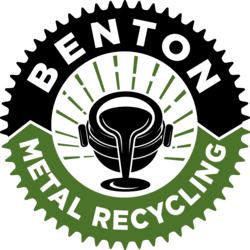It's Saturday 11:05 AM — Sorry, we're closed

Indiana law states a business can only purchase a catalytic converter that’s not still attached to a vehicle if the person trying to sell it has proof of ownership of the vehicle the part came from. Such documentation can include a vehicle title or registration, a receipt from a transaction of repair for the vehicle, or an affidavit by a law enforcement officer attesting to the officer’s reasonable belief that the catalytic converter lawfully came into the possession of the person attempting to sell the catalytic converter.
CATALYTIC CONVERTER RECYCLING
Your car’s exhaust system is more valuable than you may think – particularly the catalytic converter, which is made from a variety of metals, including copper, iron, nickel, palladium, platinum, manganese, rhodium, and cerium. While all of these metals are recyclable, palladium, platinum, and rhodium are particularly valuable and are highly sought after in the jewelry, electronics, and industrial industries.
Extracting these metals from your catalytic converter takes special skills and tools, which is why Benton Metal Recycling offers catalytic converter recycling in the Benton, Hobart, Crown Point and surrounding areas.
When you recycle your failed catalytic converter with Benton Metal Recycling, you not only put cash in your pocket (we pay cash on the spot), but you also help protect the environment by putting the precious metals from your recycled catalytic converter back into production, which reduces the need for mining.
Of course, the best way to ensure you receive the best price when you recycle your used catalytic converter is to trust the specialists at Benton Metal Recycling, which has a strong reputation for offering top prices to residents of Benton, Hobart, Crown Point, and beyond.
CASH FOR YOUR RECYCLED CATALYTIC CONVERTER
What is a Catalytic Converter?
A catalytic converter converts three harmful compounds that are found in car exhaust into harmless exhaust byproducts:
- Hydrocarbons (in the form of unburned gasoline)
- Carbon monoxide (formed by the combustion of gasoline)
- Nitrogen oxides (created when the heat in the engine forces nitrogen in the air to combine with oxygen)
Without your catalytic converter, your car exhaust would spew smog and poisons into the air. For instance, hydrocarbons produce smog, carbon monoxide is poisonous to humans and all other animals that breath air to survive, and nitrogen oxides also lead to not only smog, but also acid rain.
A catalytic converter converts hydrocarbons into carbon dioxide and water, carbon monoxide into carbon dioxide, and nitrogen oxides back into nitrogen and oxygen.
The safest and most effective way of recycling your catalytic converter is to bring it to Benton Metal Recycling, proudly serving Benton, Hobart, Crown Point, and surrounding areas.
Why You Should Recycle Your Failed Catalytic Converter
- When you recycle your used catalytic converter with Benton Metal Recycling, you put cash in your pocket. The metals in catalytic converters have value, and we pay top dollar for recycled catalytic converters.
- Mining ore and fabricating the metals found in catalytic converters is not only energy and labor intensive, but also harmful to the environment. By recycling your catalytic converter, you help Planet Earth.
How are Catalytic Converters Recycled?
As with most materials, we grade the catalytic converter and separate the recyclable components. We then transfer these metals to other companies for repurposing.
Recycling the metals from a catalytic converter is difficult and tricky, which is why you should never attempt to do this yourself. Even if your car is scrap, bring your catalytic converter to us for recycling, as removing the metals can be dangerous. Left undisturbed, catalytic converters are not a threat to your health or the environment. However, once a catalytic converter is opened up for recycling, it is considered hazardous waste. As such, you want to put your recycled catalytic converter in the hands of experts who have the relevant experience and safety equipment.

Indiana law states a business can only purchase a catalytic converter that’s not still attached to a vehicle if the person trying to sell it has proof of ownership of the vehicle the part came from. Such documentation can include a vehicle title or registration, a receipt from a transaction of repair for the vehicle, or an affidavit by a law enforcement officer attesting to the officer’s reasonable belief that the catalytic converter lawfully came into the possession of the person attempting to sell the catalytic converter.
CATALYTIC CONVERTER RECYCLING
Your car’s exhaust system is more valuable than you may think – particularly the catalytic converter, which is made from a variety of metals, including copper, iron, nickel, palladium, platinum, manganese, rhodium, and cerium. While all of these metals are recyclable, palladium, platinum, and rhodium are particularly valuable and are highly sought after in the jewelry, electronics, and industrial industries.
Extracting these metals from your catalytic converter takes special skills and tools, which is why Benton Metal Recycling offers catalytic converter recycling in the Benton, Hobart, Crown Point and surrounding areas.
When you recycle your failed catalytic converter with Benton Metal Recycling, you not only put cash in your pocket (we pay cash on the spot), but you also help protect the environment by putting the precious metals from your recycled catalytic converter back into production, which reduces the need for mining.
Of course, the best way to ensure you receive the best price when you recycle your used catalytic converter is to trust the specialists at Benton Metal Recycling, which has a strong reputation for offering top prices to residents of Benton, Hobart, Crown Point, and beyond.
CASH FOR YOUR RECYCLED CATALYTIC CONVERTER
Your car’s exhaust system is more valuable than you may think – particularly the catalytic converter, which is made from a variety of metals, including copper, iron, nickel, palladium, platinum, manganese, rhodium, and cerium. While all of these metals are recyclable, palladium, platinum, and rhodium are particularly valuable and are highly sought after in the jewelry, electronics, and industrial industries.
Extracting these metals from your catalytic converter takes special skills and tools, which is why Benton Metal Recycling offers catalytic converter recycling in the Benton, Hobart, Crown Point and surrounding areas.
When you recycle your failed catalytic converter with Benton Metal Recycling, you not only put cash in your pocket (we pay cash on the spot), but you also help protect the environment by putting the precious metals from your recycled catalytic converter back into production, which reduces the need for mining.
Of course, the best way to ensure you receive the best price when you recycle your used catalytic converter is to trust the specialists at Benton Metal Recycling, which has a strong reputation for offering top prices to residents of Benton, Hobart, Crown Point, and beyond.
What is a Catalytic Converter?
A catalytic converter converts three harmful compounds that are found in car exhaust into harmless exhaust byproducts:
- Hydrocarbons (in the form of unburned gasoline)
- Carbon monoxide (formed by the combustion of gasoline)
- Nitrogen oxides (created when the heat in the engine forces nitrogen in the air to combine with oxygen)
Without your catalytic converter, your car exhaust would spew smog and poisons into the air. For instance, hydrocarbons produce smog, carbon monoxide is poisonous to humans and all other animals that breath air to survive, and nitrogen oxides also lead to not only smog, but also acid rain.
A catalytic converter converts hydrocarbons into carbon dioxide and water, carbon monoxide into carbon dioxide, and nitrogen oxides back into nitrogen and oxygen.
The safest and most effective way of recycling your catalytic converter is to bring it to Benton Metal Recycling, proudly serving Benton, Hobart, Crown Point, and surrounding areas.
Why You Should Recycle Your Failed Catalytic Converter
- When you recycle your used catalytic converter with Benton Metal Recycling, you put cash in your pocket. The metals in catalytic converters have value, and we pay top dollar for recycled catalytic converters.
- Mining ore and fabricating the metals found in catalytic converters is not only energy and labor intensive, but also harmful to the environment. By recycling your catalytic converter, you help Planet Earth.
How are Catalytic Converters Recycled?
As with most materials, we grade the catalytic converter and separate the recyclable components. We then transfer these metals to other companies for repurposing.
Recycling the metals from a catalytic converter is difficult and tricky, which is why you should never attempt to do this yourself. Even if your car is scrap, bring your catalytic converter to us for recycling, as removing the metals can be dangerous. Left undisturbed, catalytic converters are not a threat to your health or the environment. However, once a catalytic converter is opened up for recycling, it is considered hazardous waste. As such, you want to put your recycled catalytic converter in the hands of experts who have the relevant experience and safety equipment.

DIRECTIONS TO OUR FACILITY
Hours
Monday: 8 AM – 4 PM
Tuesday: 8 AM – 4 PM
Wednesday: 8 AM – 4 PM
Thursday: 8 AM – 4 PM
Friday: 8 AM – 4 PM
Saturday: 7:30 AM – Noon
Sunday: Closed

